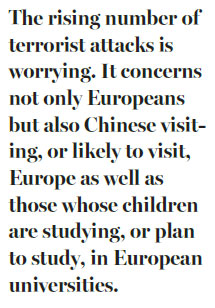Safer Europe could attract more

EU leaders should recognize the immediate need to bolster confidence of tourists, investors
A friend from Beijing was in Brussels a few weeks ago to attend a business meeting and, before departing for London on the afternoon of June 20, he told me at the Brussels airport, which suffered a deadly terrorist attack 15 months ago, that, "Europeans have a short memory."
What he referred to was the fact that people were no longer required to undergo security checks before entering the airport.
On March 22 last year, Brussels suffered two terrorist attacks - one at the airport and the other at the metro station close to the European Union headquarters - that prompted the authorities to make security checks mandatory at the entrance to the airport. However, these were withdrawn a few months later. No such security checks were introduced at metro stations, despite the high-level security alert in Belgium.

In Beijing and many other cities in China, such security checks are now mandatory at airports and railway stations.
My friend's casual remark was followed by two foiled attacks in Brussels a few hours later. Another attack was reported from Antwerp the next day.
On the night of June 20, according to prosecutors, a Moroccan national tried to detonate a bomb in a suitcase at Central Station in Brussels, but he was shot by security officers before he could cause any damage.
Across the border in France, a man with a rifle and explosives in his car tried to ram his vehicle into a police van in the Champs-Elysees shopping district of Paris on June 19. And the United Kingdom has suffered four attacks since March 22, which claimed many lives - including that of a Chinese national. Incidentally, March 22 marked one year since the Brussels attacks.
The security situation in Western Europe has worsened over the past few months, although security forces deserve praise for thwarting some terrorist attacks.

And such attacks spare none. After the attack at Brussels Central Station was foiled, at least two Chinese nationals called the help line of the Chinese embassy in Belgium to say they were at the site that day, which prompted the embassy to warn Chinese nationals, either staying in Belgium or planning to visit the country, to be on constant alert and avoid public gatherings.
Many countries issue travel alerts for countries and cities. So do Chinese embassies in the UK, Germany, France and some other countries. But now such alerts are becoming more frequent for EU countries.
The rising number of terrorist attacks is worrying. It concerns not only Europeans but also Chinese visiting, or likely to visit, Europe as well as those whose children are studying, or plan to study, in European universities.
EU leaders and European governments are aware of these concerns. The number of Chinese tourist groups visiting many EU countries fell in 2015 and 2016. So far, the EU can take comfort in the fact that, despite the threats, investors in general have not shied away from Europe. Figures show investments in Europe, at least from China, are steadily growing, though several EU countries are unwisely thinking of imposing measures to curb such activity by Chinese companies and individuals.
Hopefully, EU leaders will realize the immediate need to make European cities safer so as to attract more investments and tourists.
The author is deputy chief of the China Daily European Bureau.
Contact the writer at fujing@chinadaily.com.cn
(China Daily European Weekly 07/07/2017 page13)
Today's Top News
- US actions fail to match its words on Taiwan question
- China's diplomacy to blaze new trails
- Visits point way to better future for all
- PLA tests joint combat strength for second day
- Xi stresses advancing rural areas' vitalization
- US arms sale to Taiwan will lead secessionists toward destruction






























